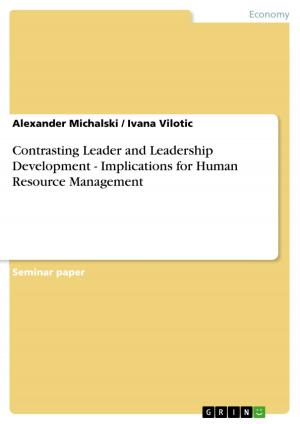We are living in an era of globalisation, yet there is evidence that distance still matters, and increasingly so
Why distance still matters and its implications for world economic development
Business & Finance, Economics, International| Author: | Arturo Minet | ISBN: | 9783638816779 |
| Publisher: | GRIN Publishing | Publication: | July 10, 2007 |
| Imprint: | GRIN Publishing | Language: | English |
| Author: | Arturo Minet |
| ISBN: | 9783638816779 |
| Publisher: | GRIN Publishing |
| Publication: | July 10, 2007 |
| Imprint: | GRIN Publishing |
| Language: | English |
Essay from the year 2007 in the subject Economics - International Economic Relations, grade: 1,0, University of Warwick (University of Warwick, UK, Dep. of Economics), course: International Economic Systems since 1918, 11 entries in the bibliography, language: English, abstract: The current debate on globalization has raised an important question for economists: Is the world really becoming a 'global village' with a 'weightless economy'? In accordance with Cairncross's best-selling book The Death of Distance (2001) some economists have argued that falling transportation and communication costs are leaving 'distance' a negligible factor in the assessment of barriers to trade and integration of the world economies. Yet there is not enough funded evidence for this. Recent studies on the importance of education suggest that knowledge, as the 'basic commodity' of the 21st century and major source of future growth, makes industries and thus trade more independent of traditional physical fetters. On the contrary, it is not clear to what extent transportation costs have generally declined. Moreover it is uncertain whether the decline in shipping costs affects distant and proximate transport equally. An emerging literature is trying to give consistent explanations for the puzzling persistence of the distance effect on trade flows and economic development. In this essay we will discuss some of the evidence found so far, that distance is still 'alive'.
Essay from the year 2007 in the subject Economics - International Economic Relations, grade: 1,0, University of Warwick (University of Warwick, UK, Dep. of Economics), course: International Economic Systems since 1918, 11 entries in the bibliography, language: English, abstract: The current debate on globalization has raised an important question for economists: Is the world really becoming a 'global village' with a 'weightless economy'? In accordance with Cairncross's best-selling book The Death of Distance (2001) some economists have argued that falling transportation and communication costs are leaving 'distance' a negligible factor in the assessment of barriers to trade and integration of the world economies. Yet there is not enough funded evidence for this. Recent studies on the importance of education suggest that knowledge, as the 'basic commodity' of the 21st century and major source of future growth, makes industries and thus trade more independent of traditional physical fetters. On the contrary, it is not clear to what extent transportation costs have generally declined. Moreover it is uncertain whether the decline in shipping costs affects distant and proximate transport equally. An emerging literature is trying to give consistent explanations for the puzzling persistence of the distance effect on trade flows and economic development. In this essay we will discuss some of the evidence found so far, that distance is still 'alive'.















